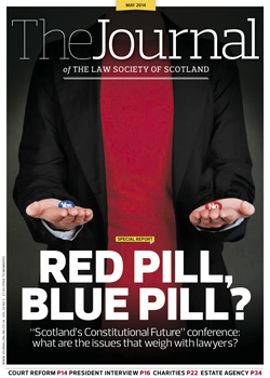Unfinished business

Twenty-one years ago, he came to Council as a young radical determined to shake it up. Despite dramatic changes over that time, he regards the work of reform as unfinished. As he assumes the Presidency, what can solicitors expect from Alistair Morris’s term of office?
He arrives with a track record in running a successful practice. As chief executive of Fife-based Pagan Osborne, where he has spent his career since graduating from Aberdeen University, he has seen the company expand into Edinburgh, now employing 120 people across six offices, and win a healthy share of the private client market.
Morris’s ethos for any legal firm is “to stay relevant to the clients, and to accept that the client and the consumer has the ultimate power”: to decide who offers what they perceive as value for money. That translates back into what he wants the Society to do, “because I want to try to make the Society ever more relevant to its members: we have to be seen to be giving value to our members in return for their subscriptions, whether in private practice, in-house or in the public sector. I want the Society to be relevant to them, which means that the representative side of the Society has to be held in as high esteem as the regulatory side, for example”.
Wanted: a strategy
What motivated the young Morris to join Council? “I felt it was very conservative, very reactionary. There were things I wanted to do at Pagan Osborne that the rules of the Society wouldn’t let us, and I thought I could do something about that,” he explains. Unsurprisingly, he initially felt he was being given “a pat on the head” and told he would understand in a year or two what it was all about. In fact, that understanding helped shape his views on what the Society needed.
“I came to realise that the Society didn’t have a strategy, didn’t have a business plan, didn’t have objectives, and it really needed to have those on which to hang any of its decisions or direction of travel. That got me into involvement at a strategic level.”
There evolved the President’s Committee, a grouping of (invited) senior Council members; then the board was created, “which was much more open and transparent, in the sense that there was election to get on to the board, and the interaction between the board and the Council is evolving all the time”. As a board member, Morris has helped shape the “Towards 2020” strategy which now sets out the Society’s key goals and the route to achieving each. Changed times indeed, but Morris wants to see more.
“I still describe the Society as a sponge. You pour water into it and it doesn’t change its shape; in my case you pour time into it and it doesn’t change its shape. It has changed a lot, and is changing in the right directions, but there’s always going to be more to do.”
Can he, then, sympathise with solicitors who feel the Society isn’t in touch with them?
“I do sympathise with them, but I do wish that they would interact more with the Society, with their eyes open, and perhaps be more willing to recognise the areas where the Society does represent them well and the areas where the Society is interacting with others on their behalf. I accept that we will never get the communication perfect, but it’s amazing how many partners in small firms say they think the Council is influenced or dominated by the big firms, and partners in big firms say exactly the opposite! The truth, of course, is that it’s neither, but there is this perception, from whichever end of the spectrum you come from, that you’re not being represented as well as you’d like to be.”
Financial health issues
One thing that Morris sees as having affected all sectors of the profession alike is the recession, which he believes is having a continuing impact on its health. “The depth and longevity of the recession has had a toll on law firms. We are all under pressure now and have to accept that the privileged position of being a professional and a solicitor is no longer currency.”
Yet, at the same time, he worries that the current upturn will make some practitioners less inclined to pursue a much-needed review of their business model, putting it aside as too difficult to deal with. What if they don’t?
“There will be a widening gap between the successful and the less successful. Because I think that those firms who have taken a review of their business model, their structure, their cost base, what they are offering to their clients, and who push through changes from that review will succeed, whereas those who either pull back from their review or who haven’t started it, will get left behind.”
Does the Society have a role here? “The Society can work with law firms to try to find structures and models to allow them to prosper. A good example is the threat of contracting to criminal legal aid. A lot of practitioners are sole practitioners and the Society can help them, should contracting be introduced, to successfully bid for contracts and to meet the critieria that SLAB will set. I would like to see the return of an economically vibrant profession and that means getting our economies of scale right, getting our structures right, and being encouraged to do that.”
Talking of structures, another priority for his year relates to finally achieving alternative business structures, of which Morris is an “unashamed fan”, believing there to be opportunities for practices of all sizes – though he acknowledges that during the delay, many firms have found a way to achieve what they wanted without necessarily going through the ABS approval route.
Meanwhile, there are risks for the Society, and with it the Master Policy and Guarantee Fund, from the ongoing run of cross-border amalgamations, if that leads to subscriptions being diverted south of the border. “I don’t know if ABSs themselves will stop cross-border amalgamations, which are the sum of the economic environment that we’re in”, Morris observes.
“The Society has to be attractive, to gain the level of subscriptions that it needs to progress and develop. And the only way it can do that is if it is seen as relevant, so that individual solicitors and firms want to be part of the Scottish Law Society.”
Government: finding a balance
If any sector has had its differences with Drumsheugh Gardens in recent times, it is legal aid practitioners. Are the mechanisms now in place to engage with them fully, when the next set of Government proposals emerges?
“I really hope so, because we’ve worked very hard in successive presidencies to build constructive relations with legal aid practitioners, and I would say that at the moment we seem to be on the same page for most issues.” For Morris, I addition, part of the challenge is to understand the Government’s agenda, “so that we can start to try to influence the end game as opposed to reacting to announcements as they come from the Scottish Government. There are many agendas running at the same time, in the whole field of courts and legal aid, and it would be good to try and get ahead of the agendas rather than reacting to them”.
Yet Morris also believes that relations with ministers are as good as at any point in his time on Council. “There are things we don’t agree with, and it’s quite right we should be standing up and forcefully making the point that we don’t agree, but even within the legal aid and court reforms there are elements that we do agree with, and it’s equally important we make that clear, and if we’re not agreeing, explaining why and coming up with constructive alternatives.”
“The Society represents a broad church, and it’s very important for us to be able to represent that entire breadth of interest with the Scottish Government. I don’t believe it’s appropriate for us to jeopardise our relationships for the whole in order to protect a sector of the profession. There has to be a balance.”
The Government may of course be soft pedalling on some issues ahead of the referendum, and Morris also detects some decline in business activity, and therefore client instructions, while uncertainty persists over issues such as currency. But he believes that, whatever the outcome, there will be new opportunities for legal work after the September vote.
Glasgow 2015
Asked about other significant issues for his year, Morris reports that following the Society’s review of fair access to the profession, the Education & Training Committees “are working very hard at achieving a system and a process that does protect access to all and everyone – it’s not a done deal by any stretch of the imagination, but I’m proud and pleased with the Society’s response and the progress it’s making towards ensuring that fair access means fair access”.
The biggest event for the Society, however, will be the Commonwealth Law Conference in Glasgow next April, the greatest legal gathering in Scotland for many years. Is it as significant for the profession?
“What I think is important is that it’s going to remind us of some of the fundamentals of the rule of law and freedom of speech, right to protest, all these things we take for granted, which is not the case in certain countries of the Commonwealth. It’s an opportunity to put a bit of feelgood back into what we do as solicitors, and something we can feel proud of in how we serve our clients and what we stand for in civil liberties with our clients.”
Recent presidential terms of office have been turbulent at times, but in concluding, Morris hazards the comment: “It seems slightly strange to say it, but I kind of feel things are under control at the moment!” In some ways he even regrets the lack of contentious business at this year’s AGM. “You don’t want huge controversy in the profession, you don’t want the profession split in two, but equally it’s good to have healthy debate and good constructive discussion. AGMs and SGMs are all about that, and it’s disappointing when it doesn’t happen.”
In this issue
- Immigration: where British nationals lose out
- Family actions: be prepared
- The psychology of post-adoption contact
- Attack vectors into the law: Heartbleed
- When family farming partnerships go wrong
- Reading for pleasure
- Opinion: Gillian Mawdsley
- Book reviews
- Profile
- President's column
- The results are in
- The best medicine?
- LBTT: key points for solicitors
- Courts: why the reforms add up
- Unfinished business
- The voice of technology
- Capacity: a growing issue
- Charities and the rise of social enterprises
- Referendum – the rules of debate
- Rewriting the rules
- Family leave – bedevilled by detail
- Strictly confidential?
- Budget: your flexible friend
- Scottish Solicitors' Discipline Tribunal
- Food for thought
- The consumer protection challenge
- People on the move
- Ask us another
- Healthy discord
- Claims, trends and targets
- Ask Ash
- Law reform roundup
- Cost of Time 2014: survey now open






